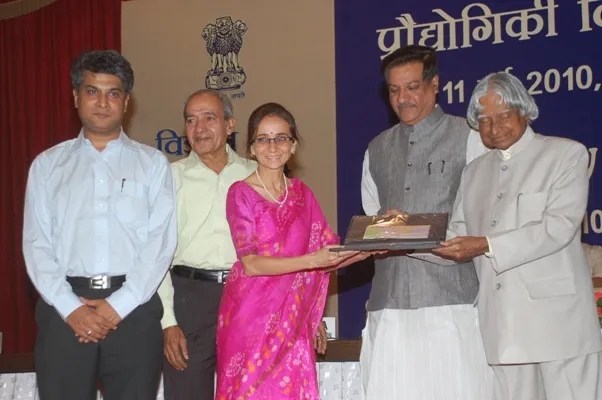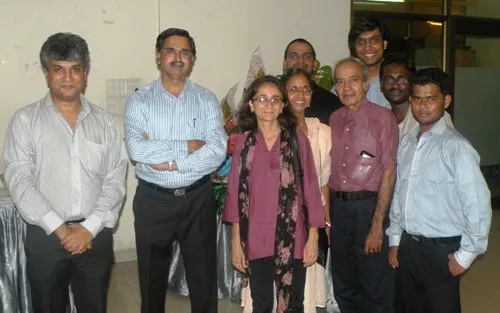[Startup Hatch] IIT Bombay’s SINE drives 50 cutting-edge tech startups
[This article is part of a series called Startup Hatch, about incubators and accelerators in the startup ecosystem.]
Poyni Bhatt has been the Chief Operations Officer, Society for Innovation and Entrepreneurship (SINE http://www.sineiitb.org), Indian Institute of Technology Bombay, India, since January 2004. SINE manages a technology business incubator at IIT Bombay. SINE is a leading academic linked business incubator in India.
An IT business incubator was set up at Kanwal Rekhi School of Information and Technology, IIT Bombay in 1999; SINE came into existence in 2004. The Department of Science and Technology of the Government of India has also provided financial assistance to the business incubator. The incubator, with infrastructure spread over 10000 sq.ft., can accommodate about 15-17 companies.
Poyni has worked on the formation of SINE, and has implemented the incubation program. She has been involved with over 40 startups that have been incubated by SINE. Poyni has over 25 years of experience in operations, legal, finance and policy matters in industry and academia. Prior to SINE, she held senior management positions for over a decade in ICICI Securities in Mumbai, and Ashima Group, a textile conglomerate based in Ahmedabad.
Poyni is a member of the Future Trends Forum, an initiative of Bankinter Foundation for Innovation, Spain. She is a member of several government committees for entrepreneurship, and has also been contributing articles for technology and business papers and magazines. She joins us in this exclusive interview on challenges and opportunities for Indian entrepreneurs, overcoming ‘me-too’ syndrome, the review process for incubation, and the track record of successful and folded ventures from the incubator.

YS: What was the founding vision of your incubator, and how is it supported?
A: SINE (Society for Innovation and Entrepreneurship) is a technology business incubator at the Indian Institute of Technology Bombay (IIT Bombay). IIT Bombay is a leading science and technology institute with under-graduate and post-graduate programmes, and also has programmes in humanities, management and industrial design. IIT Bombay has strong interaction and collaborative activities as also licensing and technology transfer activities.
SINE was set up in 2004 to administer a business incubator, and provide support for technology-based entrepreneurship. It extends the role of IIT Bombay by facilitating the conversion of research activity into entrepreneurial ventures. Thus SINE leverages strong technology expertise in terms of faculty and research students, and a very energetic under-graduate student pool - an ideal combination for venture creation.
SINE’s vision is to provide an environment to translate knowledge and innovation into creation of successful entrepreneurs. It strives to create an ecosystem amongst the IIT Bombay community that will lead to the creation of wealth and social value through successful ventures.
IIT Bombay has provided physical infrastructure and funding support for initial expenditure for the incubator centre. Government departments like Department of Science and Technology (DST), Department of Information Technology (DIT) and Technology Development Board have also provided financial assistance for the setting up of incubator and seed support for companies.

YS: What is the background/profile of the managers/leaders of your incubator?
A: We are a team of 3 senior functionaries, and 3 support staff. Each of the senior members is professional with 10 to 20 years of industry experience. They have background in banking, legal, compliance, business and medical science.
YS: What would you say are the Top Three opportunities for Indian startups?
A: - Maturing ecosystem conducive for entrepreneurship. This includes availability of startup funding for good ideas, mentors and experts willing to help startups. We now also have success stories of first generation entrepreneurs.
- Emerging young talents that can be tapped for entrepreneurship. We see a trend of young people wanting to start their ventures or work with startups. Awareness is spreading.
- Government is proactively initiating various programmes to support innovations and entrepreneurship.
YS: What are the key challenges faced by startups in India, and how can you help bridge the gap?
A: While funding is available for the ideas that can translate into early revenue, venture funding for the ideas that are yet to be validated or for product prototypes is almost non-existent in India. Except for government programmes, not much capital is available before seed capital or angel investment stage. In the process, product based ideas with long gestation time do not get much support unless they are in an academic or R&D set up. Experimentation capital and capital with time tolerance is a big challenge.
There are also other challenges in Indian entrepreneurship: most startups lack original ideas, and are of a me-too nature. They tweak existing solutions or business models.
At the incubator level, we have a pre-incubation programme to encourage innovative ideas. We have set up experimental labs for young innovators. We are also trying to raise some innovation funds. Also, SINE leverages government programmes for innovations.
Startups need easy access to the Industry. Industry linkages could benefit them for their idea validation, it could be an end market for them, or help them in raising strategic resources. At SINE, we have industry professionals' presence on board. We also organise events where large corporates are invited. Overall, we are well networked with industry.
YS: What are the selection criteria for startups in your incubator?
A: We select companies based on business plan review process. We follow a two level review process. We invite business plans from the interested entrepreneurs and review them internally at first level. The final review is done by external reviewers who are typically domain experts, industry professionals, entrepreneurs or investors. Based on external reviewers' feedback, companies are incubated or asked to do further work before they get incubated. During this process, entrepreneurs also get mentoring in various elements of business plans.
YS: What support and services do startups receive in your incubator?
A: SINE provides physical infrastructure that includes office space and office productivity equipment. The incubator also has shared resources like conference and meeting rooms, experimental lab, pantry, and so on. Conference rooms are equipped with audio and video conference facilities. SINE also facilitates access to business networks, and organises events and workshops. We help companies in raising funds from investors and also provide seed support to our companies. Companies get benefitted by the overall ecosystem which is a combination of academic, research and business environment.
YS: What kinds of IP are being created by your startups?
A: Ours is a broad-spectrum science and technology business incubator. We have companies in the areas of energy, audio technology, high end security and surveillance products, engineering software, environment technologies, education and so on.
YS: How would you differentiate your incubator from the other incubators in the field?
A: For success of any incubator, the people behind it play a very important role. At SINE, the core team has strong industry exposure in varied domains. It has a balanced board which is represented by technology and industry professionals and entrepreneurs. Together, they bring business perspective to the incubator.
Being hosted at a leading technology institute, we focus on technology and IP or product based startups where the gestation period is long. During this period, they require a very good amount of handholding. Our incubator emphasises more on support like mentoring, expert resources, and business network rather than just physical infrastructure.
As an incubator, we have a very structured approach as to the processes, incubatee selection, monitoring and so on. Our processes have evolved over time, based on experience. Convenient and easy cost models for IP acquisition and incubation help reduce upfront capital cost for the companies. Ours is also one of a few academic-linked incubators which has achieved financial sustainability out of incubation income in the initial years itself.
YS: What would you define as success for your incubator?
A: We measure our success on multi parameters. Some of them are:
- Number of companies incubated, their survival and growth after graduation from the incubator. We have incubated 46 companies in last 10 years, of which 22 have graduated and survived. Fifteen companies are still being incubated.
- Number of companies receiving external funding is another important success factor. Nearly half of the total incubated companies have received external funding.
- Since we are a research and academic linked incubator, number of technologies being converted into ventures. About 20 companies are based on technologies from IIT Bombay.
YS: How do you compare and contrast India’s incubators with that of other countries like US and China?A: India is in a very early stage of its incubator movement as compared to the US and China. In the US, the overall entrepreneurial ecosystem is mature. This makes the role of incubators in the entrepreneurial ecosystem less critical. Also, there are a number of private incubators and accelerators which are not supported by public money. China too started incubators much before India's initiative. It is mainly driven and supported by government.
In India, the incubator initiative started in the last decade mainly to promote knowledge based first-generation entrepreneurship. This was also because of the fact that the overall ecosystem necessary for entrepreneurship was missing then. Most incubators are linked to academic institutes. Government have contributed to them to fill in the gap of early risk capital. The momentum is picking up, and a number of private accelerators have come in over the last couple of years. This is a very good indication.
YS: How many companies did you start off with, and which ones do you have now?
A: Our initial infrastructure was more of makeshift arrangement to support 3-4 companies. Later on, the formal incubator started with 7 companies’ infrastructure at a time, and 6 companies got incubated in the very first year of operations. At present, we have 17 companies’ infrastructure, and 15 companies are being incubated. The incubator capacity is fully utilised as a few companies have grown beyond their single office space.
SINE has so far incubated 46 companies. Of these, 15 companies are being incubated, and 22 companies have graduated, and are operating on their own or have got acquired. The rest of the companies have closed their operations or they are dormant.
Companies which were acquired are Mysuz, Voyager Infotech, Eisodus Networks, and Collcraft Technology. Companies which have folded are Ebizone, eInfinitus, Deusco, Embedded Robot Technologies, Mobiance, and Consumer Vision. Companies with no current operations include Polymeric Sensors and Kriya; companies still in operation include Phonologies.
Table 2: Incubated companies

YS: What are your plans for the coming 3-5 years with respect to new startups?
A: We plan to double our incubation capacity. We would also like to enhance scale of pre-incubation. We will engage with potential entrepreneurs who are still in experimental phase. This apart, we will extend our reach beyond our present geography by virtual incubation. We also would like set up a small innovation fund for experimental innovations. Overall, we would like to see young innovators and entrepreneurs willing to take high risks with novel ideas.
YS: What are your recommendations to the startups and entrepreneurs in our audience?
A: The environment for start ups is much better now then a decade back. Entrepreneurs must take the risk to work on original and impactful ideas rather than me-too businesses, where failure is a great learning experience and not a social stigma!
[Follow YourStory's research director Madanmohan Rao on Twitter http://twitter.com/MadanRao]


![[Startup Hatch] IIT Bombay’s SINE drives 50 cutting-edge tech startups](https://images.yourstory.com/cs/wordpress/2013/06/SINE-Receiving-award-from-President-Abdul-Kalam.jpg?mode=crop&crop=faces&ar=16%3A9&format=auto&w=1920&q=75)




